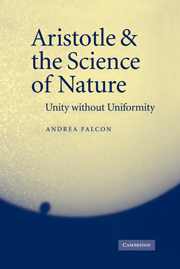4 - The limits of Aristotle's science of nature
Published online by Cambridge University Press: 22 September 2009
Summary
It is worthwhile seeking to attain more understanding regarding these things, though the resources at our disposal are few and we are at such a great distance from what happens in the heavens
(Aristotle, DC 292 a 14–17).REMOTENESS
From the opening lines of the Meteorology the science of nature emerges as a systematic investigation of the natural world. This investigation is systematic in the sense that it consists of an inquiry into the different parts of the natural world in the attempt to discover the explanatory connections existing between its parts. If this investigation is successful, it does not provide mere knowledge of the natural world; it provides understanding of it. But this investigation is systematic also in the sense that it consists in a study of the natural world in its entirety. While Aristotle does not insist on this point in the opening lines of the Meteorology, he is more explicit towards the end of PA 1. This logos ends with an exhortation to the study of the entire natural world: the celestial together with the sublunary world, and this latter in all its parts, plants and animals included (645 a 4–7). Aristotle takes it for granted that the natural world is constituted by a celestial and a sublunary part, and argues that the study of each of these two parts has its own appeal. In this logos, however, the emphasis is on the study of plants and animals.
- Type
- Chapter
- Information
- Aristotle and the Science of NatureUnity without Uniformity, pp. 85 - 112Publisher: Cambridge University PressPrint publication year: 2005



